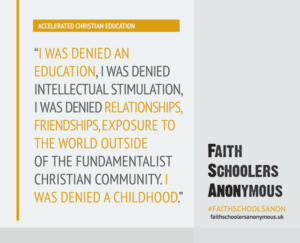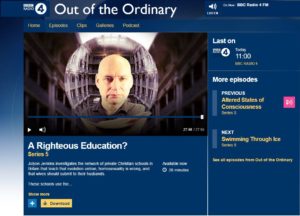“Even the smallest of our actions had the potential for grave consequences and the day to day living of life felt like a heavy responsibility, even for a small child. With this power to intimidate and threaten, it was easy to bully, manipulate and coerce.”
 I spent five years between the ages of 12 and 17, memorising bible passages, reading Christian fundamentalist literature and preparing to be a godly woman – meaning a subservient wife, home-maker and mother.
I spent five years between the ages of 12 and 17, memorising bible passages, reading Christian fundamentalist literature and preparing to be a godly woman – meaning a subservient wife, home-maker and mother.
After leaving primary school, I never entered into a secondary school. This is a perfectly legal option in the UK, to take your child out of the school system in order to be ‘educated otherwise’. These two words, ‘educated otherwise’ were repeated over and over by my mother who proudly explained her legal right to all who asked why her five children weren’t in school. I would be brought forward to give my speech; coached to say how much I enjoyed being home schooled, how I was enabled to set my own goals, work at my own pace and learn through experience rather than through books. I was told that I was lucky I didn’t have to go to school, I was lucky I had parents that cared enough to take charge of my education. Even now, as I write this, I feel guilt and a sense of anxiety opening up about what being home schooled was really like. I wasn’t ‘educated otherwise’, I was denied an education, I was denied intellectual stimulation, I was denied relationships, friendships, exposure to the world outside of the fundamentalist Christian community. I was denied a childhood.
I will talk about my time being home-schooled soon, in the second part of this blog post (which will be published here shortly). Prior to this, however, my sister and I (the 2 of the eventual 5 children old enough to be at school at this point) were initially placed in a faith school. It was newly founded by a pastor and his wife who had decided to establish a school in the attic of their church building, and asides from myself and my sister there were three other girls ranging in age from 5 to 15. The Accelerated Christian Education (ACE) curriculum was used and the classroom set up adhered to ACE’s rules. We had desks with barriers either side, so that we couldn’t see our neighbours. We had two small flags on our desk, the American flag and a flag with a cross on it. One would be raised to ask to go to the toilet and another raised for issues with our studies. We would silently study from PACEs (Packets of Accelerated Christian Education), paper booklets we had to work through independently, reading then regurgitating educational texts written from a Christian fundamentalist view point.
“I do remember feeling constantly fearful, surveyed and judged. The surveillance extended even to our menstrual cycles which were recorded by the pastor’s wife.”
Each day began with an assembly which was more like a short church service. We sang Christian worship songs, read the bible out loud, were tested on the passages we were meant to have memorised and listened to a sermon. The messages of these sermons were often quite pointed (targeted at one of us kids) and while I do not remember many details from this time, I do remember feeling constantly fearful, surveyed and judged.
The surveillance extended even to our menstrual cycles which were recorded by the pastor’s wife. I remember being called aside for a meeting with this woman who showed me my educational progress over the last month. She told me how any inconsistencies in my ability to successfully meet my goals, learn my biblical lessons and perform in my tests over the last month was evidence I was allowing my bad hormones to win over my mind and soul. Any deviation from perfection would be noted and blamed on a presumed monthly weakness. I remember trying to explain that my periods had not yet started. This didn’t matter. Any sign of weakness was failure and failure was evidence of the devil winning. I remember whenever one girl, who actually had started her periods, was suffering from cramping pain, she was continually reprimanded. Feeling pain in itself was a sin. When Jesus was crucified he broke all curses that were put upon Adam and Eve and periods (or rather the pain they bring) was one such curse. Feeling pain meant you lacked faith and lacking faith meant shame, failure, weakness and letting God down.
Another memory that stands out from this school is a particular assembly that felt more like a funeral service where we mourned the departure of one of the students (whose mother decided the school wasn’t right for her 5 year old daughter) as if she had died – no, worse that that (in evangelical terms), as if she had irredeemably lost every chance of ever going to heaven. She had left the school and so she was a traitor. She had shown herself not to be a true Christian. During the assembly/funeral service/fire and brimstone sermon, we read Psalm 91. It made such an impact on me, I remember it with great clarity.
” … he will save you
from the fowler’s snare
and from the deadly pestilence.
He will cover you with his feathers,
and under his wings you will find refuge;
his faithfulness will be your shield and rampart.
You will not fear the terror of night,
nor the arrow that flies by day,
nor the pestilence that stalks in the darkness,
nor the plague that destroys at midday.
A thousand may fall at your side,
ten thousand at your right hand,
but it will not come near you.
You will only observe with your eyes
and see the punishment of the wicked.”
We, the school children were safe. The deserter was one of the thousand who would fall at our side, who would be trapped by the fowlers snare, who would see pestilence and plague. In reading this Psalm at this time, it felt as if we were pronouncing a judgement, a sentence upon them. The prospect of a future in either heaven or hell was very real to us. It was in no way a distant, vague possibility. Judgement day WAS coming and there would be no escape. For this reason, even the smallest of our actions had the potential for grave consequences and the day to day living of life felt like a heavy responsibility, even for a small child. With this power to intimidate and threaten, it was easy to bully, manipulate and coerce.
My sister and myself left soon after this. I think there was a falling out between the leader of the school and our parents, the details of which I am unaware. We left suddenly and without warning. No goodbyes were said. Unfortunately, this was not the end but rather the beginning of my alternative education. The faith school was disturbing, but there was some semblance to a regular school. I got up in the morning, I left the house, I saw other people and was supervised by an adult. There were scheduled activities and a routine. Home-schooling took away all of these things…
The second part of this blog post, detailing my experiences with ACE at home, will be published on this site shortly.
Anonymous

